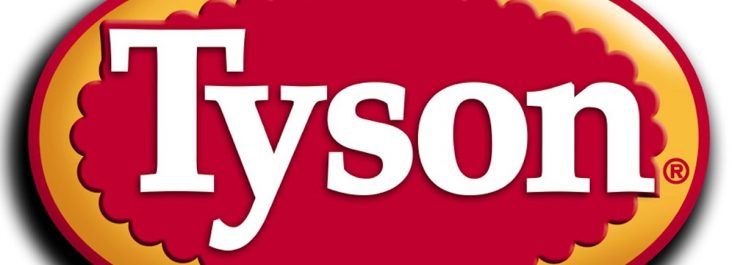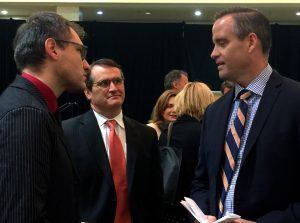New Tyson Foods CEO tells shareholders to expect ‘more innovations’
by February 9, 2017 1:15 pm 896 views

Shareholders of Tyson Foods were greeted with food and loads of hospitality at the meat giant’s annual shareholder meeting in Springdale on Thursday (Feb. 9). The crowd was, as usual, somewhat sparse but executives did not rush through the meeting as in prior years.
New CEO Tom Hayes told investors he’s humbled and excited to be leading Tyson Foods. He promised extreme focus on daily execution on the company’s primary mission to make safe and high quality food.
“Our innovation plate is full,” he said, citing everything from a robust product pipeline to ongoing stewardship practices across the organization and its supply chain.
“Sometimes we will fail,” but Hayes said that will be alright because the company will continue to do the right thing for its employees, consumers, customers and communities where it operates.
Board Chairman John Tyson welcomed Hayes to his new leadership role saying there will always be future challenges, but the company knows if it operates the business well the shareholders will be rewarded.
Chief Financial Officer Dennis Leatherby characterized 2016 financial results as a “record” on many levels from $2.8 billion in operating income, represented 26% year-over-year growth. Earnings per share rose to $4.39, up 39% from the prior year. He said Tyson shared some of that good fortune with its shareholder by repurchasing 28.2 million shares worth $1.7 billion and raised the dividend by 50%. Tyson’s dividend rose from 60 cents annually to 90 cents.
For fiscal 2017 Leatherby said the company expects revenue between $36 billion and $37 billion with volume growth offset by lower overall meat prices. The company has planned to invest $1 billion back into operations, increasing efficiencies and expanding capacity in areas with growth opportunities, namely retail chicken and prepared foods.
During the business meeting portion of the meeting, shareholders elected the slate of directors to one-year terms by a majority vote of 97.14%. The directors for this year include: John Tyson, chairman, Gaurdie Banister, former Arkansas Gov. Mike Beebe, Mikel Durham, Kevin McNamara, Cheryl Miller, Brad Sauer, Jeff Schomberger, Robert Thurber and Barbara Tyson.

The shareholders also ratified PricewaterhouseCoopers as its independent registered public accounting firm with a majority vote of 99.63%. Two other board proposals regarding executive compensation and the frequency of the advisory committee votes on compensation passed overwhelmingly with a majority of votes.
There were four other shareholder proposals made at this year’s meeting. None of these outside proposals garnered enough votes to pass. Don Sullivan representing the Teamsters spoke on the importance of Tyson to show more transparency with regard to its lobbying efforts. Sullivan said while federal lobby efforts are reported, the data is lacking and non-transparent at the state and local levels.
“Transparency is in everyone’s best interest,” he said.
Only 11.8% of shareholders voted in favor of the transparency in lobbying proposal.
Alex Galimberti, advisor for Oxfam America in Boston, read proposals for more board diversity and a increased sustainable water usage plan. Both proposals were defeated. Just 2.39% of votes were for the board diversity proposal and only 14.46% of shareholders voted for the sustainable water plan.
Galimberti told Talk Business & Politics this was his first trip to Springdale and the annual meeting. He was encouraged that the sustainable water proposal which has been raised for several years continues to draw support. Last year the same proposal garnered about 11% approval.
“We will keep trying on this issue because it is so very important,” he said.
Tim Nichols, represented the UAW Trust and local teamsters presented a proposal that would extend proxy access to shareholders. This proposal would allow outsiders to seek board appointment if they garnered enough votes. The proposal also failed with just 21.69% in favor. This was the closest of all the investor proposals came to passing given that the Tyson Family controls an overwhelming majority of votes with the company’s dual class system. The family trust controls 70,000 shares of Class B stock that have 10 votes for every 1 share of Class A stock held by investors.
